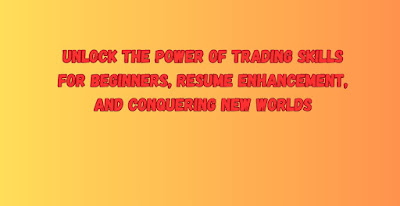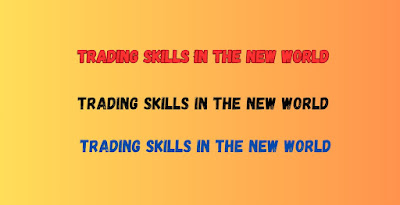Unlock the Power of Trading Skills for Beginners, Resume Enhancement, and Conquering New Worlds
Explore the world of trading skills, from beginners' tips to enhancing your resume and conquering new virtual realms. Uncover trade skill examples, lost ark strategies, and trader skills that empower you to succeed.
Introduction
Trading skills are the cornerstone of success in various domains, ranging from the financial market to the virtual gaming world. Whether you're new to trading or seeking to enrich your resume, the ability to navigate trades, manage risks, and make informed decisions is crucial. This comprehensive guide delves into the intricacies of trading skills for beginners, their impact on your resume, their relevance in the new world of online trading, concrete trade skill examples, strategies for Lost Ark, and essential trader skills.
Trading Skills for Beginners
Embarking on a trading journey can be both exciting and daunting for beginners. Laying the foundation for success involves understanding key concepts:
Embracing Market Fundamentals
Navigating the intricate landscape of the financial market requires more than just a casual understanding—it demands a robust grasp of its underlying fundamentals. As a newcomer, immersing yourself in the basics of supply and demand dynamics, market trends, and the influence of economic indicators on asset prices is of paramount importance.
Imagine the financial market as a dynamic ecosystem where the forces of supply and demand converge to determine the value of assets. Supply represents the quantity of a particular asset available for trading, while demand reflects the interest of investors to acquire that asset. The interplay between these two forces establishes the equilibrium price—a pivotal point where buyers and sellers find common ground.
Delving deeper, comprehending market trends is like deciphering the rhythm of a complex symphony. Markets are known to move in cycles, alternating between periods of bullish optimism and bearish pessimism. Being attuned to these trends allows you to anticipate potential price movements, helping you make informed decisions.
However, market trends are not the only notes in this symphony; economic indicators play a crucial solo as well. These indicators, which include metrics like inflation rates, employment figures, and GDP growth, provide insights into the overall health of an economy. Their impact on asset prices can be profound. For instance, a strong jobs report may boost investor confidence and drive up stock prices, while high inflation could trigger concerns about purchasing power and lead to declines in bond prices.
By cultivating a comprehensive understanding of these elements, you'll be equipped with the analytical tools needed to navigate the financial market. Remember, just as a seasoned sailor relies on knowledge of the winds and tides to navigate uncharted waters, your grasp of supply and demand dynamics, market trends, and economic indicators will be your compass in the intricate world of trading.
Risk Management
In the realm of trading, effective risk management serves as the sturdy foundation upon which successful endeavors are built. Think of it as the guardian of your capital, ensuring that even in the face of market uncertainties, your investments remain safeguarded. To achieve this level of security, it's essential to delve into various techniques, such as setting stop-loss orders and mastering the art of position sizing.
Imagine setting sail on a trading voyage without the tools to manage potential risks. It's akin to navigating treacherous waters without a compass. This is where the concept of a stop-loss order comes into play. Just as a skilled captain adjusts the sails to avoid turbulent currents, a stop-loss order acts as your automatic safety net. It's a predetermined price point at which a trade will be closed, limiting potential losses. This tactical maneuver ensures that your exposure to risk is controlled, even if the market takes an unexpected turn.
Another crucial facet of risk management is position sizing—an art form that involves determining the appropriate amount of capital to allocate to a trade. Picture yourself as a strategic general on the battlefield, carefully allocating troops to different sections. Similarly, in trading, each position represents a piece of your capital, and deciding how much to invest requires meticulous calculation. Position sizing prevents a single trade from depleting your entire capital, enabling you to withstand a series of losses and continue trading with confidence.
The relationship between stop-loss orders and position sizing is like a harmonious duet. Setting a proper stop-loss order aligns with your risk tolerance, while judicious position sizing ensures that even if stop-losses are triggered, your overall capital isn't severely impacted.
In essence, effective risk management is the compass that guides your trading voyage. By mastering techniques like stop-loss orders and position sizing, you'll be equipped to navigate the tumultuous waters of the market with prudence and foresight. Remember, just as a skilled tightrope walker knows the importance of a safety net, a successful trader understands that protecting capital is the key to longevity in the trading arena.
Technical Analysis
Unlock the power of technical analysis by studying price charts, identifying patterns, and utilizing indicators to make informed trade decisions.
Emotional Intelligence
Trading often involves managing emotions. Develop emotional intelligence to control impulses, avoid overtrading, and stay level-headed during market fluctuations.
Trading Skills for Resume Enhancement
Did you know that trading skills can enhance your resume, even if you're not pursuing a finance-related career? These skills showcase your versatility and valuable attributes:
Decision-Making Under Pressure
Employers value candidates who can make swift decisions under pressure. Trading hones this skill as split-second choices impact financial outcomes.
Analytical Abilities
Analyzing market data and trends sharpens your analytical skills, applicable in fields like data analysis, marketing, and strategic planning.
Adaptability
Markets change rapidly, requiring traders to adapt. Highlight your adaptability on your resume, indicating your capacity to thrive in dynamic work environments.
Quick Problem-Solving
In trading, solving problems in real-time is essential. This skill translates seamlessly to roles that demand on-the-fly solutions.
Trading Skills in the New World
The digital era has birthed new realms for trading beyond traditional markets. In virtual environments like the New World, these skills remain invaluable:
In-Game Economies
Virtual worlds often have economies mirroring the real world. Mastering trading skills can help you amass virtual wealth and resources.
Collaboration and Negotiation
Trading within virtual communities necessitates collaboration and negotiation – skills transferrable to remote work and online collaborations.
Resource Management
Just as traders manage capital, gamers manage in-game resources. Sharpened resource management skills enhance your gaming experience.
Trade Skill Examples from Lost Ark
Lost Ark, a popular MMORPG, presents opportunities for lucrative trading. Excel in these trade skills to thrive in the game:
Crafting Proficiency
Craft items and equipment to sell or trade with other players, capitalizing on your crafting skills.
Market Speculation
Buy low and sell high within the in-game market, employing real-world trading principles for virtual gains.
Exploration Trade
Gather rare resources during your adventures and trade them for profit, unlocking various in-game opportunities.
Essential Trader Skills
Becoming a successful trader encompasses skills that span different disciplines:
Patience and Discipline
Successful traders exercise patience, waiting for optimal opportunities and adhering to their trading strategies with discipline.
Continuous Learning
Markets evolve; so must traders. Commit to ongoing learning about market trends, strategies, and emerging technologies.
Networking
Networking with other traders fosters knowledge exchange, providing insights and perspectives beyond individual analysis.
FAQs
How quickly can I master these trading skills?
The timeline varies, but consistent practice and learning can accelerate your progress.
Are trading skills only relevant to financial markets?
No, these skills have applications in gaming, virtual economies, and various professional fields.
What's the most challenging aspect of mastering trading skills?
Managing emotions and psychological aspects of trading can be particularly challenging.
Can I apply trading skills to cryptocurrency markets?
Absolutely, the principles of trading apply to cryptocurrency markets as well.
How do I develop emotional intelligence for trading?
Practicing mindfulness, journaling emotions, and analyzing trades can enhance emotional intelligence.
Is it possible to recover from trading losses?
Yes, proper risk management and learning from losses can pave the way for recovery.
Conclusion
Trading skills transcend boundaries, offering benefits in finance, gaming, and beyond. Whether you're a beginner taking your first steps or an experienced trader honing strategies, these skills unlock doors to success. Embrace the art of trading, enhance your resume, conquer new virtual worlds, and witness the transformative impact of mastering trading skills.


